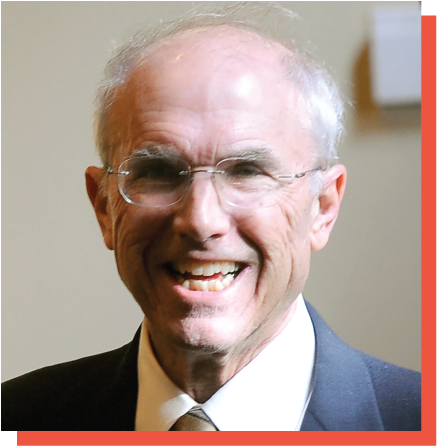Irving Rein earned his PhD from the University of Pittsburgh and is currently a Professor of Communication Studies at Northwestern University. His primary research and teaching interests are popular culture, crisis management, and place marketing. He is also the author of many books on effective communication strategies, and currently researching the distribution and content changes affecting popular culture.
Can you tell us a bit about the founding of the MSC Program?
In 1984 there was a company out in Naperville, Illinois, and they asked Professor Paul Arnston and I whether we would be interested in creating a custom technical communication program for their company. We were interested so we went out to Naperville to talk about it. But one thing led to another and they told us they couldn’t do the program anymore. So Paul and I drove home. On the way we stopped at a restaurant, and sat around and decided to go ahead and start the program ourselves.
What was the idea behind the program?
The program was modelled off of the Kellogg Executive Management program, and the idea of the program was to be a communication version of an MBA. The fundamental question then was this: what did these students need to know? They needed to know how to write well, as well as understand audiences and who they’re communicating with. What’s interesting is you go into nonprofit and for profit companies, and they still don’t know how to do these things. Through our experiences, we saw the need for good fundamental communication skills and a lack of cultural awareness everywhere we went.
So that’s basically what we do here. We tell students how to write a message, present it, adapt it to an audience, distribute it, how to get to stakeholders, and more. Whatever field it’s in, we should ask ourselves, ‘Do I understand the audience and who the producers of the audience are? What are the takeaways and what will they remember?’ When I do my own consulting work I face these issues all the time. These are all fundamental and timeless questions.
The room we are sitting in right now is the original MSC room. This was where the very first class happened in September 1984 with 12 students. That was 32 years ago. The core idea of the program actually has not changed from my perspective. The fundamental program is still there and these same questions are just as relevant today.
Can you talk about the class you teach for MSC and what you want students to take away from your class?
I usually teach a Crisis Communication seminar. I cover how crisis began, the importance of public presentation, types of arguments, audiences, and talk about things I’ve experienced not in literature. I also make sure students have accounted for interpersonal relationships as a very important part to crisis communication.
Because the MSC students are mainly working people, they have more theoretical and practical experience than the undergraduates I teach, so I need to adapt my teaching. There is an immediacy in the graduate market, and it is more focused on real world experience. We — faculty and students– are people who look at the communication environment and we sort it out. We help make decisions, help with clarity, make the ideas work. We bring an organizational aspect to processes that others may have not thought about. For example, in any business, I want make sure my students have a way of looking at crisis situations so they can accumulate information and use it quickly. I’ve been in situations where there is a lot at stake and a mistake could cost a lot. Sometimes I tell people to do nothing. One of the conventional wisdoms is to move quickly during crises, but sometimes that is not the best strategy. You have a group of students in various states, and in six months to a year from now they will be faced with these communication issues. The key thing for them is, can they apply choices? I may not know the answers, but my job is to give them the choices. I find a never ending need for this.This Crisis Communication workshop was open to the public this past December.
What makes Northwestern MSC different from other Masters in Communications programs?
The offer you can’t get anywhere else is top notch quality professors who not only know what’s going on in the field, but also do the original research. We really wanted people who could tell stories but also talk about theories and principles, and took theories and applied them to actual events. This way, when students walk out of here, they understand why they are doing something. Alumni come back and say, during a crisis where I had to explain something, I was the one who was able to apply this theory and do this. We offer a broad-based communication degree, not a specialized degree. We are not just social media or internet based. We are a program that covers a wide base of skills and understanding so you can apply it anywhere. Finally, Northwestern itself is also a very fine institution with a lot of resources. We want these people to go out and do well for themselves and represent Northwestern well, so we help them.
Any generally interesting or unique research or projects that you specifically have been working on through the program that alumni or prospective students might like to know about?
I’m working on a book about the influence of popular culture. We are looking at music, television, film, all the texts, comics, fashion. We are looking at how our communication strategies affect our behavior. I would take the position that all communication is culturally based. The book is targeted at people in communication. If you don’t know what’s going on it’s hard to be a communication specialist. I look at music as strategy and at culture as strategy. I’m looking at how it works with a broader lens. I believe a lot of great communication is embedded in music and comedy, not just speeches.



 The Custom Leadership Program is a Saturday-only program in which students pick their electives based on their individual goals for career and personal growth. I graduated from this version of MSC in 2011 and really benefited from being able to choose electives that were of most interest to me, but what I loved most was the flexibility of being able to go to class on Saturday and implement ideas in the workplace on Monday morning. With electives capped at 24 students, the discussion in the classroom was enriched and we had tremendous access to world-class professors. Being able to discuss theories and immediately implement them in the workplace was of tremendous value to someone who was not able to attend a program that met during the week or in the evenings.
The Custom Leadership Program is a Saturday-only program in which students pick their electives based on their individual goals for career and personal growth. I graduated from this version of MSC in 2011 and really benefited from being able to choose electives that were of most interest to me, but what I loved most was the flexibility of being able to go to class on Saturday and implement ideas in the workplace on Monday morning. With electives capped at 24 students, the discussion in the classroom was enriched and we had tremendous access to world-class professors. Being able to discuss theories and immediately implement them in the workplace was of tremendous value to someone who was not able to attend a program that met during the week or in the evenings. my strategic communication class and Professor Iden) puts together an hour-long performance featuring the talented owner, Terry Straker, and store employees, in conjunction with the guests who donate food for Evanston’s homeless.
my strategic communication class and Professor Iden) puts together an hour-long performance featuring the talented owner, Terry Straker, and store employees, in conjunction with the guests who donate food for Evanston’s homeless.